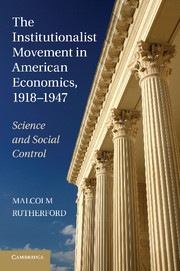Book contents
- Frontmatter
- Contents
- List of Tables
- Acknowledgments
- PART ONE INTRODUCTION
- PART TWO INSTITUTIONALIST CAREERS
- PART THREE CENTERS OF INSTITUTIONAL ECONOMICS
- 5 Institutionalism at Chicago and Beyond
- 6 Amherst and the Brookings Graduate School
- 7 Wisconsin Institutionalism
- 8 Institutional Economics at Columbia University
- 9 The NBER and the Foundations
- PART FOUR CHALLENGES AND CHANGES
- PART FIVE CONCLUSION
- Archive Collections Consulted
- References
- Index
- Titles in the series
5 - Institutionalism at Chicago and Beyond
Published online by Cambridge University Press: 03 May 2011
- Frontmatter
- Contents
- List of Tables
- Acknowledgments
- PART ONE INTRODUCTION
- PART TWO INSTITUTIONALIST CAREERS
- PART THREE CENTERS OF INSTITUTIONAL ECONOMICS
- 5 Institutionalism at Chicago and Beyond
- 6 Amherst and the Brookings Graduate School
- 7 Wisconsin Institutionalism
- 8 Institutional Economics at Columbia University
- 9 The NBER and the Foundations
- PART FOUR CHALLENGES AND CHANGES
- PART FIVE CONCLUSION
- Archive Collections Consulted
- References
- Index
- Titles in the series
Summary
For most economists, the terms “Chicago economics” and “institutionalism” denote clearly antithetical approaches to the discipline. Members of the modern Chicago School such as George Stigler have often made highly dismissive remarks concerning American institutionalism. Stigler in particular devoted himself to fierce attacks on the work of Gardiner Means, John Kenneth Galbraith, Richard Lester, and anyone else who ventured to question either the virtues of the free market or the empirical superiority of competitive price theory. Some of these attitudes have their roots in the interwar period, most obviously in Frank Knight's views on the centrality of price theory to any properly “scientific” economics (Knight 1924), and in his bitingly critical attacks on the policy positions of institutionalist and other advocates of regulatory intervention and of the “social control” of business (Knight1932). Nevertheless, what this chapter seeks to reveal is the central place of the University of Chicago in the formation and early history of the institutionalist movement. In the period up to 1918, the Economics Department at Chicago contained, at various times, virtually all of those individuals most closely associated with the founding of the institutionalist movement: Veblen, Hoxie, Mitchell, Hamilton, Moulton, and Clark. In addition, the department of philosophy contained John Dewey and George Herbert Mead. Chicago has a strong claim to be seen both as the birthplace of what became known as institutional economics and a place from which institutionalism spread to other institutions.
- Type
- Chapter
- Information
- The Institutionalist Movement in American Economics, 1918–1947Science and Social Control, pp. 125 - 151Publisher: Cambridge University PressPrint publication year: 2011

